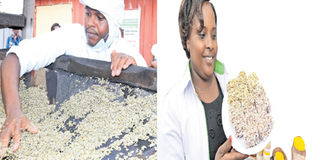Couple pops snacks from good old millet

Elizaphan (left) and Lilian Gichangi at their pearl millet enterprise in Embu. Their business, which was started in October 2016, seeks to ride on the snacking culture in the country to promote the consumption of the cereals. PHOTOS | ANITA CHEPKOECH | NMG
What you need to know:
- They learnt of the business opportunity following training by Bioversity International, an NGO.
- The institution also assisted them to import a pressure-popping machine at Sh200,000.
- The grains are put inside the popping machine and the entire process takes a few minutes.
- From just a kilo of pearl millet, the pops volume expands about 20 times but weighs 800 grams due to moisture loss.
Being on the leeward side of Mt Kenya, some parts of Embu have an uncharacteristic semi-arid climate.
But rice, mangoes and avocados are some of the crops that thrive in the region, alongside pearl millet (Pennisetum glaucum) and sorghum, hardy cereal crops that do well in dry conditions.
The cereals are among those referred to as ‘orphaned’ because they are grown and consumed by a few.
A couple in Embu, however, has found a formula to boost consumption of pearl millet, in particular, by making snacks.
Elizaphan and Lilian Gichangi pop the cereal into lovely snacks under their agribusiness, Kieru Cereal Snack Company.
The small shop located in Majengo in Embu is fenced off with iron sheets and surrounded by indigenous trees.
Seeds of Gold finds the couple and their three employees at the cereal cleaning area, an aerated space on the first floor of their building.
“We get sorghum and millet from our contracted farmers and add value by popping them as happens with popcorn. We then pack and sell them,” says Gichangi.
He notes that the business, which was started in October 2016, seeks to ride on the snacking culture in the country to promote the consumption of the cereals.
They learnt of the business opportunity following training by Bioversity International, an NGO.
The institution also assisted them to import a pressure-popping machine at Sh200,000.
To make the snacks, the process starts with cleaning the cereals. “We first winnow, then wash them thoroughly using water and dry them on meshed racks. Once completely dry, we take the cereals to the popping room,” says Gichangi.
The grains are put inside the popping machine and the entire process takes a few minutes.
“The popping machine must first be pre-heated for perfect results. We then put pearl millet, for instance, into the cylinder and close.” The pressure of the machine must rise above the atmospheric pressure for it to pop the cereal.
“Once you hear the bell ring, it means we are about to release the pressure and the sound will be deafening. That is why we wear ear masks,” says Gichangi as he demonstrates the process.
MARKET DEMAND
He rings the bell after about seven minutes and hits a lever on the machine with a hammer.
What follows are sweet-smelling white pops with brownish edges, chucked by the pressure into a collecting bin.
From just a kilo of pearl millet, the pops volume expands about 20 times but weighs 800 grams due to moisture loss.
The pops are then taken to the processing room where Gichangi turns them into nutritious cakes.
“We first heat a mixture of syrup, sesame oil and turmeric powder in a heavy pan and keep stirring until the thermometer reads 1200C. The heated syrup is then poured into a mixture of the popped millet and dried mangoes and groundnuts with hibiscus colouring, and thoroughly stirred.”
The pops are then blended with milled baobab, mangoes, bananas, honey, soya beans, amaranth, bananas or groundnuts, to give them different flavours and make them nutritious.
From a kilo of millet, the couple gets 144 cubes of the product which they sell at Sh10 each.
“We package the product in industrial polythene packs and sell at our shop in Embu market,” says Lilian.
She notes that they source a tonne of millet and sorghum from contracted farmers every month, with a kilo of each going at Sh65, on average.
“We pop a maximum of 50kg at a time, depending on the market demand, and the remainder is sold at our shop in Embu.” Gichangi says penetrating the market with the new product, which is certified by the Kenya Bureau of Standard, has not been easy.
“We took time to educate neighbours and fellow traders on the nutritional value while giving them samples to taste,” says Gichangi, who hopes the products will attain a countrywide reach.
Dr Patrick Maundu, a senior researcher at the National Museums of Kenya, says some foods risk becoming extinct if we do not find novel ways of making them palatable.
“There are more than 10 cereals, but most are unknown because they are neglected. Popping is one of the ways these foods can be consumed other than the traditional cooking methods. There is also puffing of cereals,” he says.
****
Get it fast
Nutritious millet
Pearl millet does well in dry areas.
It is highly nutritious, with high levels of protein, magnesium, zinc and fibre content.
It also has a type of amino acid known as lysine. The cereal is close to 5,000 years old and was first grown in Mauritania and Niger.





